词语辨析及单词用法
单词辩析
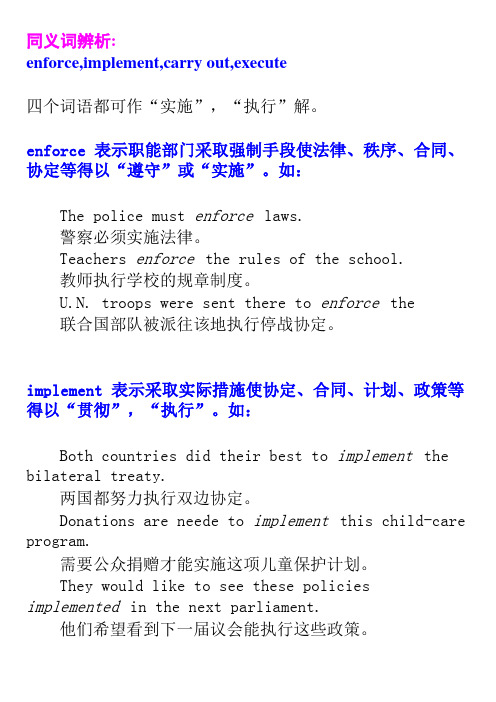
同义词辨析:enforce,implement,carry out,execute四个词语都可作“实施”,“执行”解。
enforce 表示职能部门采取强制手段使法律、秩序、合同、协定等得以“遵守”或“实施”。
如:The police must enforce laws.警察必须实施法律。
Teachers enforce the rules of the school.教师执行学校的规章制度。
U.N. troops were sent there to enforce the truce. 联合国部队被派往该地执行停战协定。
implement 表示采取实际措施使协定、合同、计划、政策等得以“贯彻”,“执行”。
如:Both countries did their best to implement the bilateral treaty.两国都努力执行双边协定。
Donations are neede to implement this child-care program.需要公众捐赠才能实施这项儿童保护计划。
They would like to see these policies implemented in the next parliament.他们希望看到下一届议会能执行这些政策。
carry out 是个较通俗的词语,其含义与implement相似,表示“执行计划(或协议、政策、命令)”等。
如:The director said that they should carry out his advice.主任说他们应将他的意见付诸实施。
Did you have any difficulty in carrying out your plan?.你们在执行计划的过程中有过什么困难嘛?He was simply carrying out the instructions he had received.他只不过是在执行他所接到的命令。
最常用英语词语辨析
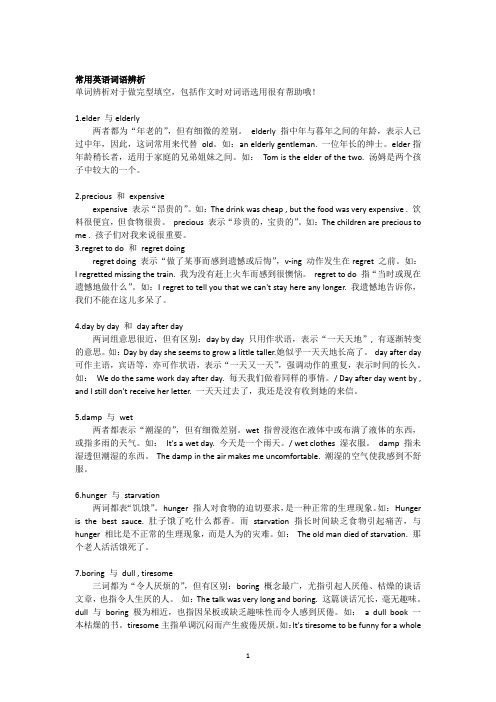
常用英语词语辨析单词辨析对于做完型填空,包括作文时对词语选用很有帮助哦!1.elder 与elderly两者都为“年老的”,但有细微的差别。
elderly 指中年与暮年之间的年龄,表示人已过中年,因此,这词常用来代替old。
如:an elderly gentleman. 一位年长的绅士。
elder指年龄稍长者,适用于家庭的兄弟姐妹之间。
如:Tom is the elder of the two. 汤姆是两个孩子中较大的一个。
2.precious 和expensiveexpensive 表示“昂贵的”。
如:The drink was cheap , but the food was very expensive . 饮料很便宜,但食物很贵。
precious 表示“珍贵的,宝贵的”。
如:The children are precious to me . 孩子们对我来说很重要。
3.regret to do 和regret doingregret doing 表示“做了某事而感到遗憾或后悔”,v-ing 动作发生在regret 之前。
如:I regretted missing the train. 我为没有赶上火车而感到很懊恼。
regret to do 指“当时或现在遗憾地做什么”。
如:I regret to tell you that we can't stay here any longer. 我遗憾地告诉你,我们不能在这儿多呆了。
4.day by day 和day after day两词组意思很近,但有区别:day by day 只用作状语,表示“一天天地”, 有逐渐转变的意思。
如:Day by day she seems to grow a little taller.她似乎一天天地长高了。
day after day 可作主语,宾语等,亦可作状语,表示“一天又一天”,强调动作的重复,表示时间的长久。
词语辨析常用动词的用法与区别
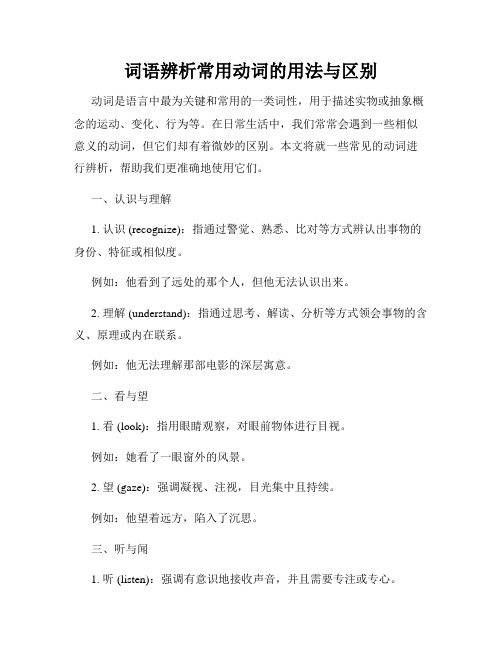
词语辨析常用动词的用法与区别动词是语言中最为关键和常用的一类词性,用于描述实物或抽象概念的运动、变化、行为等。
在日常生活中,我们常常会遇到一些相似意义的动词,但它们却有着微妙的区别。
本文将就一些常见的动词进行辨析,帮助我们更准确地使用它们。
一、认识与理解1. 认识 (recognize):指通过警觉、熟悉、比对等方式辨认出事物的身份、特征或相似度。
例如:他看到了远处的那个人,但他无法认识出来。
2. 理解 (understand):指通过思考、解读、分析等方式领会事物的含义、原理或内在联系。
例如:他无法理解那部电影的深层寓意。
二、看与望1. 看 (look):指用眼睛观察,对眼前物体进行目视。
例如:她看了一眼窗外的风景。
2. 望 (gaze):强调凝视、注视,目光集中且持续。
例如:他望着远方,陷入了沉思。
三、听与闻1. 听 (listen):强调有意识地接收声音,并且需要专注或专心。
例如:我听到了远处传来的音乐声。
2. 闻 (smell):指用鼻子感知气味,通常是无意识或自然反应。
例如:我闻到了花园中花朵的香气。
四、做与创造1. 做 (do):指进行某种行动或活动。
例如:今天,我要做一些家务。
2. 创造 (create):强调通过思维、创造力或想象力产生新的事物或概念。
例如:他利用木头和石头创造了一座美丽的雕塑。
五、说与讲1. 说 (say):泛指通过口头方式表达意思、讲话。
例如:他对我说了一些慰问的话。
2. 讲(speak/talk):强调通过口头方式交流思想、创造性地陈述观点。
例如:他在演讲中讲述了自己的创业经历。
六、走与行1. 走 (walk):指用脚步离开、前进,一般速度较慢。
例如:她每天早上都走到公司。
2. 行 (go):强调朝某个目的地出发或进行移动。
例如:他要去超市行一趟。
七、买与购买1. 买 (buy):指交换金钱以获取商品、服务等。
例如:我买了一本新书。
2. 购买 (purchase):强调通过购物行为获得商品,语气正式。
英语常用词语辨析

在英语中,有很多常见的词语由于用法或含义的微妙差异而需要区分。
以下是一些例子:1.“Effect” 和“Affect”:–“Effect” 通常是名词,表示“影响”或“结果”,如:The new policy had a great effect on sales.–“Affect” 是动词,表示“影响”,如:The weather affected our plans. 2.“Their”, “There”, “They’re”:–“Their” 是形容词性物主代词,表示“他们的”,如:Their car isparked outside.–“There” 通常用于指地点,或者表示存在,如:There is a book on the table.–“They’re” 是“they are” 的缩写,表示“他们是”,如:They’re going to the cinema.3.“Your” 和“You’re”:–“Your” 是形容词性物主代词,表示“你的”或“你们的”,如:Your book is over there.–“You’re” 是“you are” 的缩写,表示“你是”或“你们是”,如:You’re right about that.4.“Then” 和“Than”:–“Then” 通常用于表示时间顺序或接着发生的事情,如:First, we’ll have lunch, then we’ll go shopping.–“Than” 用于比较,如:This one is bigger than that one.5.“Its” 和“It’s”:–“Its” 是所有格形式,表示某物的,如:The cat licked its paws.–“It’s” 是“it is” 或“it has” 的缩写,如:It’s a beautiful day.这只是其中的一部分,英语中的这类词汇还有很多,理解和掌握它们的正确使用是提高语言水平的关键。
高中英语单词辨析(整理)1
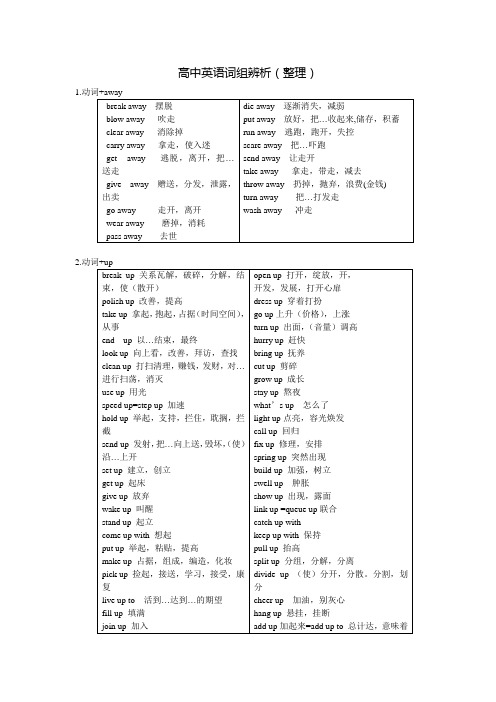
高中英语词组辨析(整理)1.2.3.ifif ready 如果准备好if so 如果这样的话if not 如果不是这样的话if necessary 如果有必要的话if possible 如果有可能的话if any 如果有…的话if only 要是…的就好if ever 极少,难得4.thanrather than 而不是other than 除了more than 多余…不仅仅是less than 少于worse than 比…更差5.6.Timein no time 立刻at one time 曾经at no time 绝不at a time 一次the first | next time …相当于连词,后接句子for the first time 第一次,相当于副词It /This is the first /second…time that sb has/have done sth.was had done sth.It’s time that sb did sth.7.8.禁止forbid somebody from doing sth.discourage sb. from doing sth.prevent sb. from doing sth.keep sb. from doing sth .stop sb. from doing sth.9.Setbe set in 以…为背景set out / off for sp. 动身去某地set sail for sp. 起航去某地set out to do sth. =set about doing sth .着手做某事set off 出发,引发,燃放set up 创立,建立set down =put /write/take down 写下,记录下set aside 省出,留出,把…放在一边set the table =lay the table 摆放餐具,准备吃饭10.Breakbreak out 战争爆发break in 插话,闯入break up (关系)破裂break off 打断,中断break through 突破break down 机器坏了,精神奔溃break away 脱离11.Taketake on 呈现,雇佣take after sb. 在(长相或性格)像某人take back 收回前言take down 记下,取下take in 理解,吸收,欺骗,将衣服改小take off 脱下,起飞,(事业)成功take over 接受,接管take up 继续,占据,开始从事某事take into 把…带入take away 带走take place 发生take apart 拆卸take part in 参加13.Cutcut back on 削减,减缩cut across 抄近路通过cut away 切除cut in 插嘴cut off 切断cut down 砍到,削减cut up 切碎cut out 去除cut after 追赶cut short 使…忽然停止,中断,打断16.Try 相关的短语try on 试穿,试验try out 试用,试验try out for 参加…的选拔try sth. on 在某人/某物上试某物try to do sth. 努力…try doing sth. 尝试…try one’s best 尽最大努力have a try 尝试18.Loselose heart 灰心lose one’s heart to 喜欢…lose face 丢脸lose weigh 减肥lose faith in 对…失去信心lose touch with sb. 失去与某人的联系lose one’s way 迷路lose one’s life 丧生lose one’s job 失业19.表“因为”的短语as a result /consequence ofbecause ofthanks todue toon account ofowing to20.与leave 有关的短语leave for 离开去…leave sb. with sth. 给某人留下…leave out 删除,省略leave behind 遗忘,使…落后leave word 留言leave aside 搁置,不考虑leave alone 更不用说leave behind 把…抛在后面,离开leave off 遗漏,停止(leave off doing sth.)leave over 剩下,推迟21.与“set”有关的短语22.“与…有关联”的相关短语be associated withbe connected withbe related withbe linked tohaving something to do with23.与24.忙于做某事be engaged inbe absorbed inbe buried inbe addicted ine into force/effect/view/existence掌权,生效,近在眼前,出现26.与“bring”相关的短语bring sb. to do 使某人做…bring sb. doing 引来某人做…bring about 带来,造成bring down 达到,降低bring forward 提出bring in 收(庄稼),引来,引进,挣得,生产,出产bring out 使显出,使…明白的显现出来bring up 教育,抚养,呕吐27.29.show 的相关短语for show 为着外衣,为装门面on show 在展出show sb. around 领某人参观…show sb. in/out 领某人进来/进去show off 炫耀,卖弄show oneself 出现,现身show up 出席,露面,使…突出,显眼30.与“give”有关的短语give one’s life to 把生命奉献给…give away 赠送,泄露give in (to sb )屈服,让步(于…)give off 发出(光,烟,气味等)give out 发出…分发,用尽,筋疲力尽give over to 支付…把…托付给give up 放弃give way (to)让步,给…让路give back31.32.33.34.shut 有关的短语shut in 围绕shut away 把…隔绝shut down 牢牢的把…关上,关闭(厂,店等),(雾,黑暗)笼罩shut off 关掉(水,煤气,电等),遮挡,切断(交通,道路)shut out 不让…进入,遮挡住shut up 闭嘴,紧紧关上35.与“sight”有关的短语at first sight 乍一看,第一眼就…at (the)sight of 一看见…catch sight 看见…发现…in sight 在视野围之,看得见…out of sight 看不见的lose sight of 看不见,忽略37.All有关的短语above all首先,首要after all 毕竟all along 一直,始终all in all 总体来说all over 浑身,到处at all 根本(用于否定句和条件句)in all 总计,共计38.含有“have”的短语have nothing /sth.in common with 与…有共同之处have the talent to do sth.(abilty )=have a talent /gift for 有做…的天赋have trouble /difficulty (in)doing sth.做某事有困难have sb. do/doing have sth. donehave no choice but to do 做…别无选择,只能…have affection for 喜欢have an effect on 对…有影响have a vivid memory of 对…有清晰的印象39.let 的相关短语let alone 不打扰,不惊动,更别提let down 放下,使失望,不支持let in 让…进入let out 放出,发出,泄露let go (of)松手,放弃let off 排放40.call有关的短语call for help 大声呼救make/pay a call on 拜访…make/give a call to 给..打call for 需要邀约call after 以某人的名字为…命名call in 召来,请来call on/upon (专程)拜访某人,号召,指派call out 大声叫,召集call up 打,使….想起call at sp.(专程)拜访某地41.keep 相关的短语keep doing 继续做keep sb.doing 使某人做keep sth. done 使…被…keep from doing 避免做…keep sb. from doing阻止keep away 避开,使远离keep back 后退,使后退,抑制keep out 不进去,使留在外面keep up (with)跟上,不落后43.把…看做…,把….视为…把…当做look on/upon as…regard …as/to be …recognize …as…treat …as…think …as…. Cider sb./sth. to be /as…think …to be see …as …view…as..44.就某人而言from the point of view of sb. fom one’s point of viewin one’s opinionas far as sb. be concerned on a personal note personallyas to mein my view45.“决不”的几种形式by no meansin no case/in no way under no circumstances on no caseat no timeon no consideration46.离开前往某地make one’s way tobe off tohead forleave fordepart forset off for47.处理,解决see todeal with/do with handlesolvesettlecope withfix48.有能力做…have ability to do sth.be able to do sth.be capable of doing sth. be competent to do sth.50.与“thought”有关的短语give though to 思考be lost in thought 陷入沉思without thought 不假思索have thought of 有…的想法on second thought 转念一想read one’s thoughts 看懂某人的心思51.对…满意be happy/pleased/satisfied/content withbe content to do sth.做…感到高兴52.与“reach ”相关The beggar reached out his hands for money 伸出(手)beyond(above ,out of )one ‘s hands 达不到的,力所不能及的,不能理解的make a reach for (sb./sth.)生出手,企图抓住…within easy reach of 在容易达到…的地方,在…的附近within one’s reach在某人力所能及的围,在某人能达到的围reach for 生出手去抓住reach a conclusion 得出一个结论reach their destination 达到他们的目的地reach sb. by telephone 通过找到/联系某人reach to the back of the classroom 传到教室的后面。
大学英语四级考试常考词语辨析精解 (60组, 334个单词)
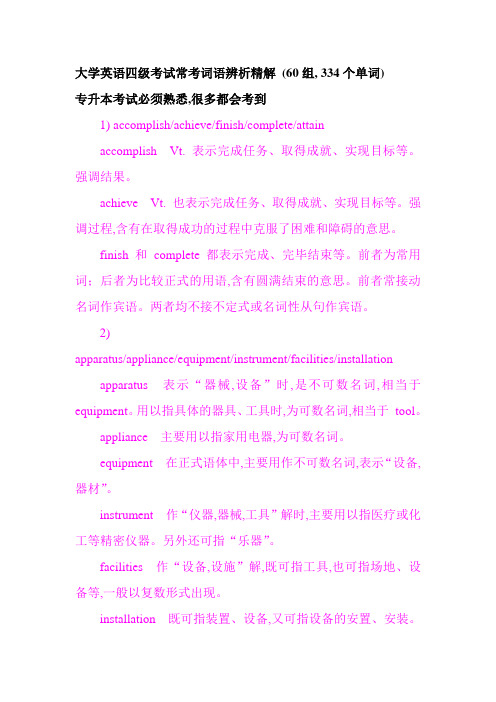
大学英语四级考试常考词语辨析精解(60组, 334个单词)专升本考试必须熟悉,很多都会考到1) accomplish/achieve/finish/complete/attainaccomplish Vt. 表示完成任务、取得成就、实现目标等。
强调结果。
achieve Vt. 也表示完成任务、取得成就、实现目标等。
强调过程,含有在取得成功的过程中克服了困难和障碍的意思。
finish 和complete 都表示完成、完毕结束等。
前者为常用词;后者为比较正式的用语,含有圆满结束的意思。
前者常接动名词作宾语。
两者均不接不定式或名词性从句作宾语。
2)apparatus/appliance/equipment/instrument/facilities/installation apparatus 表示“器械,设备”时,是不可数名词,相当于equipment。
用以指具体的器具、工具时,为可数名词,相当于tool。
appliance 主要用以指家用电器,为可数名词。
equipment 在正式语体中,主要用作不可数名词,表示“设备,器材”。
instrument 作“仪器,器械,工具”解时,主要用以指医疗或化工等精密仪器。
另外还可指“乐器”。
facilities 作“设备,设施”解,既可指工具,也可指场地、设备等,一般以复数形式出现。
installation 既可指装置、设备,又可指设备的安置、安装。
3) argue/dispute/debate/discuss/quarrel前四个词都有“辩论”的意思,但各有侧重;quarrel 则指“争吵”。
argue 指就自己的看法或立场提出论证,和人家辩论,着重“说理”、“论证”和“企图说服”。
可接that 引导的名词从句。
dispute 意味着意见有分歧,争论激烈,常含有“相持不下”或“未得解决”的意思。
不接名词从句。
debate 着重在正式场合(如辩论会),和意见对立的人进行全面的、彻底的辩论,各自陈述自己的理由。
初中英语常用词语辨析大全

初中英语常用词语辨析-从A ...................................................... .......1.at the moment\in a moment\for a moment\at the moment=right now"此时此刻",用于现在时。
in a moment = very soon “很快,立即”,一般用于将来时的句子。
for a moment “此刻,一会儿”表示时间的延续。
[例] He is out at the moment.此刻他不在家。
I will come back in a moment.我一会儿就回来。
Hold on for a moment.请稍候。
...................................................... .......2.a few/ few(1)a few, few 用来修饰可数名词。
(2)a few “有一些”,表示肯定概念,few 几乎没有,表示否定意义。
[例] The man has been here for many years, so he has a few friends.这个人在这里住了很多年了,他有一些朋友。
I am a new comer here, so I have few friends here.我刚来到这里,所以我在这里没有几个朋友。
...................................................... .......3.a little/ little(1) a little, little 用于修饰不可数名词。
(2) a little “有一些”,表示肯定概念。
little “几乎没有”,表示否定概念。
[例] There is a little water in the glass.杯子里有一些水。
英语专业四级词组辨析
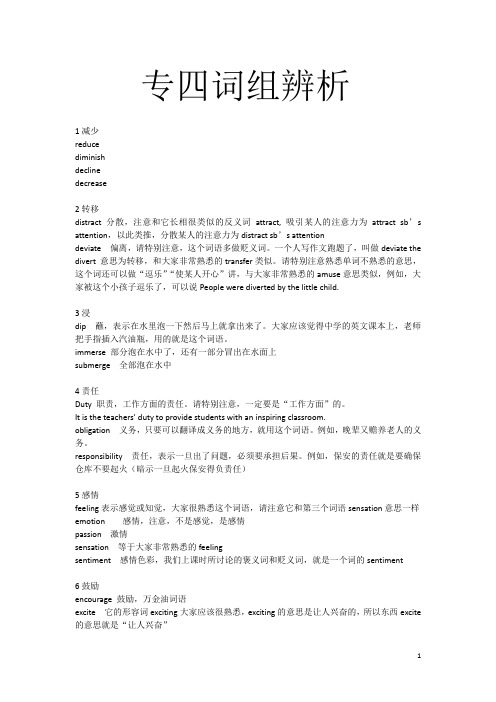
21干扰
bother打搅
interfere这个词语一般不单独用.请记住两个词组interfere into干涉=intervene, interfere with妨碍
intervene等于interfere into,干涉
inspire启发,启迪,表示开导了一个人
motivate激励,驱使,与我们以前讨论过的impel类似
stimulate刺激
7相同的
equal
equivalent第一个词语和第一个词语做形容词用法和意思都一样,但是请特别注意,equivalent还可以做名词,equal就不可以了
identical前面两个词语的意思为“相等”的,而这个词的意思为“相同的”
8设备
Equipment这个词语特别需要注意的是,它是不可数的
Instrument一般专门说乐器
Facility这个词语和第一个词形成鲜明对比,它不仅是可数的,而且一般做复数用,facilities
9形近
Facility设备
Faculty大学里的学院,特别注意,这个词语也可以表示大学老师
10必要的
necessary万金油词语
3浸
dip蘸,表示在水里泡一下然后马上就拿出来了。大家应该觉得中学的英文课本上,老师把手指插入汽油瓶,用的就是这个词语。
immerse部分泡在水中了,还有一部分冒出在水面上
submerge全部泡在水中
4责任
Duty职责,工作方面的责任。请特别注意,一定要是“工作方面”的。
It is the teachers’duty to provide students with an inspiring classroom.
- 1、下载文档前请自行甄别文档内容的完整性,平台不提供额外的编辑、内容补充、找答案等附加服务。
- 2、"仅部分预览"的文档,不可在线预览部分如存在完整性等问题,可反馈申请退款(可完整预览的文档不适用该条件!)。
- 3、如文档侵犯您的权益,请联系客服反馈,我们会尽快为您处理(人工客服工作时间:9:00-18:30)。
B. 与try构成的短语 a. try to do sth. “努力(试图或设法)做某事”如 : * I’m trying to work out a maths problem.
* I’ll try to do well in all subjects if I can enter
this high school.
初三第一学期第九讲
II. 选用适当的疑问词填空 which, what, when, how, where 1. Nobody told me ________ to do next. 2. She showed me ________ to use a computer. 3. I want to buy some Christmas presents. Please tell me ________ to buy such things. 4. There are two dresses and I can’t decide ________ to choose. 5. There is a film in our school this evening but I don't know ________ to start.
* The boy has nothing / something to do with
the matter.
* Do you have anything to do with him? * Doesn’t this thing have too much with him?
8.表示“不再”的几种英语表达法 表示“不再”的短语:no longer,not any more和 not any longer。如: * I haven’t heard from her any more. = I haven’t heard from her any longer. = I have no longer heard from her.
he takes part in the special kind of work.
* I’ll be able to see you after work next week. * After he put a lot of lamps in front of the large mirror, the doctor was soon able to operate on his
* Please try to come. b. try one’s best to do sth. “尽某人的最大努力做 某事”。如: * The parents believe that the police will try their
best to find their child.
* I’ll try my best to win the race.
You are always coming late.”
* You are always thinking of others.
* The boy is always telling lies.
*The girl is always leaving her books everywhere.
7.have nothing to do with … 表 示 “ 与 …… 无 关 ” , nothing 可 以 用 something 或anything等代替。如:
Alexander Bell.
注意下面的词性变化:
invent (v.) 发明
discover (v.) 发现
inventor (n.) 发明者 discoverer (n.) 发现者
invention (n.) 发明 discovery (n.) 发现
如:
* Edison was a great American inventor.
2. try的用法 A. try (v.)表示“试一试,尝试”,后可跟宾语 也可不跟宾语。如:
* Why not try the medicine?
* You can try the pen. You’ll like it.
* I’m afraid I can’t do it well, but I’ll try.
* She will not come to my home for clothes any more. = She will not come to my home for clothes any
longer. = She will no longer come to my home for clothes.
C. try (n.)表示“尝试”,经常用于have a try, want a try中。如:
* He didn’t really want to do it. He just wanted a try.
* I had three tries and failed each time. * I don’t know whether I can mend the clock, but I’ll have a try at it. * Give the new CD player a try and see if you like it.
mother.
B. can也表示“能够,会”,只强调本身所具 备的能力,只有两种时态;其次,can不能再与其 它的情态动词连用;第三,can还可以用来表示 “请求”,而be able to 则不能。如:
* A blind man can’t tell colours.
* At that time he couldn’t understand what his
c. try out “试验;试用;试试”。如: * Excuse me, may I try out this ball-point pen, please? * Try out the new medicine for a year and we’ll see how well it works. * We won’t know how the plan works until we have tried it out. d. try on “试穿”。如: * When I saw her yesterday, she was trying on a new coat. * Do you like this pair of shoes? Why not try them on?
5.invent与discover的辨析 discover指发现世界上早已存在,只是未被人们知
道或看到的东西;而invent是指通过想象或实验,发 明以前不存在的东西。如:
*பைடு நூலகம்Columbus discovered America.
* Madam Curie discovered radium.
*Do you know who invented the telephone?
father did because he was too young. C. could除了是can的过去时以外,用来表示
“请求”时表示语气更客气、更委婉。如: * Could you tell me who will be able to pass the
exam?
* Could you lend me some money?
4.be able to, can与could的辨析 A. be able to“能够,会”,用来强调经过努力
后最终“能够做某事了”,它有多种时态变化,还 可与某些情态动词如:must, may等连用。如:
* He hasn’t been able to answer my letter since
注意:三个词都表示“快”,但在具体用法上 很不相同。如:
* He quickly got up and went on running.
* Trees and grass grow very fast in spring.
* They’ll be back soon. “快点”是Be quick,而不说Be fast。 Come on.表示说话人单纯催促对方“快点”。
* This invention took him a long time.
*The discovery of radium has helped many people
who have got cancer.
6.always 与不同时态连用 be always doing表示经常反复发生的动作,常表 示说话人的某种感情,比如赞扬、批评、厌烦等, 带有说话人的一种感情色彩。 always和一般现在时连用,则只表示一种事实, 没有感情色彩。如: * “I’m sorry for being late again, sir.” “Again?
3. quickly, fast与soon的辨析 quickly着重指某动作“迅速”地发生或完成, 具有即刻行动,毫不耽搁的意思。 fast着重指某动作进行速度的“快”,没有即刻 发生和迅速完成的意思。 soon表示“不久”或“很快”的意思时,是指 在不久的未来将发生某个动作或出现某个情况, 也可以指过去很短时间之后发生了某个动作或产 生的某个情况。
